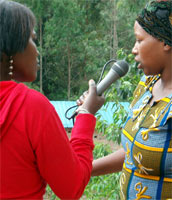Radio Salus to strengthen coffee industry in Rwanda
13-07-2007 (Paris)

Emma Claude, Radio Salus producer,
interviewing a woman coffee farmer
(Gemima Mukashyaka)
© Radio Salus
A UNESCO-sponsored radio station at the National University of Rwanda (NUR) launched an initiative focusing on the community of coffee growers.
Coffee and radio seem like an unlikely couple. Yet the two are off to a honeymoon start in Rwanda, a country with an huge community of coffee growers and a deep-rooted suspicion of radio.
Radio Salus, a UNESCO-sponsored radio station at the National University of Rwanda (NUR), recently launched a programming initiative that focuses on the community of coffee growers in Rwanda.
Aldo Havugimana, director of Radio Salus, says that "farmers have been growing coffee for over one hundred years in Rwanda with no understanding of where the coffee goes."
While coffee farming is a long-established industry in Rwanda, the coffee growers themselves have been alienated from the social relations of production. The production and circulation of coffee is thus a reflection of the global economic structure where producers are denied awareness of their social activity.
This radio programme seeks to provide information not only about the use of coffee as a consumer beverage, but also about growing and marketing techniques as well as the health of the coffee farming community. It is an initiative in partnership with Coffee Lifeline and SPREAD, a USAID-funded programme that seeks to enhance agriculture production in Rwanda as a means of development.
Two 30-minute programmes are produced each month and broadcasted every Wednesday. Until now, Radio Salus has produced three coffee programmes.
Radio Salus was inaugurated in November 2005 at the NUR in Butare. Initially a project implemented by UNESCO and funded by the European Commission, Radio Salus is currently expanding to include transmitters and bureaus throughout the country.
Already the third most listened to station in Rwanda, Radio Salus hopes to expand the population of listeners to include farmers of the coffee industry. By producing content that directly addresses and seeks to improve their livelihood, Radio Salus continues its mission of serving the various communities of Rwanda.
In a country where radio is often stigmatized for its role in promoting the genocide in 1994, Aldo Havugimana hopes that the programmes of Radio Salus will boost public confidence in the positive role media can play for societal development.
Radio Salus, a UNESCO-sponsored radio station at the National University of Rwanda (NUR), recently launched a programming initiative that focuses on the community of coffee growers in Rwanda.
Aldo Havugimana, director of Radio Salus, says that "farmers have been growing coffee for over one hundred years in Rwanda with no understanding of where the coffee goes."
While coffee farming is a long-established industry in Rwanda, the coffee growers themselves have been alienated from the social relations of production. The production and circulation of coffee is thus a reflection of the global economic structure where producers are denied awareness of their social activity.
This radio programme seeks to provide information not only about the use of coffee as a consumer beverage, but also about growing and marketing techniques as well as the health of the coffee farming community. It is an initiative in partnership with Coffee Lifeline and SPREAD, a USAID-funded programme that seeks to enhance agriculture production in Rwanda as a means of development.
Two 30-minute programmes are produced each month and broadcasted every Wednesday. Until now, Radio Salus has produced three coffee programmes.
Radio Salus was inaugurated in November 2005 at the NUR in Butare. Initially a project implemented by UNESCO and funded by the European Commission, Radio Salus is currently expanding to include transmitters and bureaus throughout the country.
Already the third most listened to station in Rwanda, Radio Salus hopes to expand the population of listeners to include farmers of the coffee industry. By producing content that directly addresses and seeks to improve their livelihood, Radio Salus continues its mission of serving the various communities of Rwanda.
In a country where radio is often stigmatized for its role in promoting the genocide in 1994, Aldo Havugimana hopes that the programmes of Radio Salus will boost public confidence in the positive role media can play for societal development.
 Emma Claude, Radio Salus producer, interviewing a technician agronomist (Paul Kalisa)
Emma Claude, Radio Salus producer, interviewing a technician agronomist (Paul Kalisa)© Radio Salus
Related themes/countries
· Community Media: News Archives 2007
· Rwanda: News Archives 2007
Share this story:
Contact information
- UNESCO
Source














